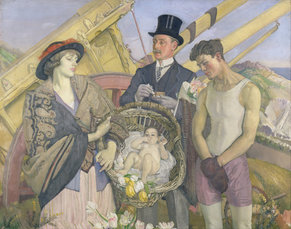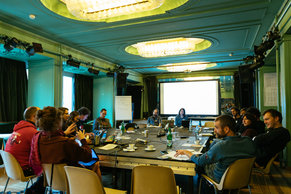
Negative Assumptions
In social situations there is much ambiguity that we must handle with assumptions. Trust issues tend to lead to negative assumptions whereby you are regularly assuming the worst about people. Viewing others in a negative light tends to reflect this negative light back on you. For example, making negative assumptions about others tends to make you less likeable and engaging in conversation.Bitterness
Allowing bitterness about perceived betrayals to become a negative force in your life such that it damages your ability to trust. This manifests as a tendency to holding grudges, look back in anger and to adopt a combative tone towards others.Failed Beginnings
The only way to build trust is to place trust. Individuals with trust issues may be so defensive that they never give others a chance to establish trust. For example, saying something cynical to someone who you have only first met such that you quickly offend them.Vicious Cycle
If you believe that other's can't be trusted you might wonder why you have to be trustworthy yourself. If you aren't trustworthy you may become increasingly suspicious that other's aren't either -- leading to a vicious cycle whereby poor trust causes poor behavior causing further declines in trust.Avoidance
Avoiding social situations and relationships. This occurs because you don't trust others and may view them in a completely negative light. This can cause you to miss out on life opportunities that might have worked out well.Protectiveness
Protectiveness such as an overly protective parent who doesn't allow their children to gain experience and resilience.Paranoia
Allowing negative assumptions to extend into the realm of paranoia whereby you easily believe others are against you. This can be self-fulfilling and self-reinforcing as your negative assumptions about people can cause them to quickly turn against you.Coolness
Coolness is the ability not to care about things that you can't control or don't need to control. For example, the ability to let others be themselves. Trust issues damage coolness whereby you may feel the need to constantly investigate or control others. People are commonly attracted to coolness and repelled by uptightness such that this can damage your social life or professional life.Control Issues
Trust issues can extend into your feelings about society, organizations, products, services and teamwork whereby you feel you want to control every aspect of your life in great detail without trust. This is hopelessly inefficient as a modern society is based on trust. For example, specialization of labor where experts are trusted to evaluate domains that require significant knowledge to understand.Privacy & Gossip
A tendency to violate the privacy of others and to be excessively gossipy whereby you aggressively seek out negative information about others. This will offend plenty of people. Often those who have the least to hide are most offended by negative gossip and privacy intrusions.Dependency
If trust issues cause you to avoid social situations or to alienate others with your behavior -- you may become dependent on those who remain close to you. This can cause a precarious situation where you are dependent on someone who you may smother with protectiveness or controlling behaviors.Cultural Capital
Higher trust tends to be associated with higher socioeconomic status. For example, in a survey of trusting attitudes 46% of high income Americans ranked as high trust compared to 26% of low income Americans1. As such, trusting attitudes may be a type of cultural capital associated with the upper class.Civility
At the level of a society, a lack of social trust may lead to a breakdown in civility, economic cooperation and social institutions. For example, if you distrust your neighbors and are aggressively monitoring them -- this may lead them to distrust you in a vicious cycle of negativity. On a global basis, the trust levels of the populations of nations is correlated to the wealth of those nations2.Reciprocal Mistrust
Humans are strongly reciprocal such that they tend to want to repay kindness and sideline or vindicate unkindness. This can result in a situation where those with trust issues are untrusted whereby their reluctance to offer trust is reciprocated.Ironic Self-fulfillment
If people who feel they don't deserve trust are more tolerant of distrustful behavior -- then you could have the ironic situation where trust issues drive you to those who are untrustworthy.Discussion
If you don't demonstrate problematic behavior -- you don't have trust issues. In other words, the term trust issue implies a problem and is not synonymous with some rational and pragmatic use of low trust.The correlation between trust and wealth isn't necessarily a cause-and-effect relationship. For example, wealthy nations may have more trustworthy systems and institutions that have created wealth. However, high trust is the norm in these societies or socioeconomic classes such that low trust individuals may have issues "fitting in" in these social environments.| Overview: Trust Issues | ||
Type | ||
Definition | Low social trust that leads to problematic behavior. | |
Related Concepts | ||





































